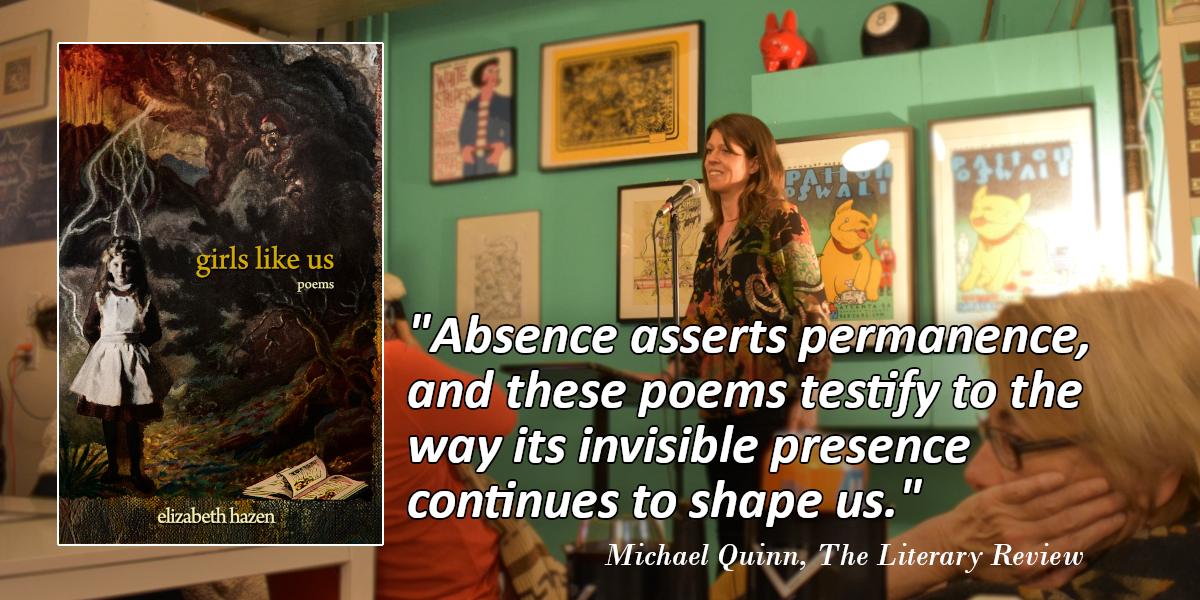TLR Delivers a Stellar Review of GIRLS LIKE US
Michael Quinn of TLR traces the arc of Elizabeth Hazen's new collection "The Last Girl" and discovers the ways in which "Absence asserts permanence."

A new review this week from The Literary Review traces the arc of Elizabeth Hazen's Girls Like Us from a "[focus] primarily on the self, [to] poems [that] are gradually consumed by a responsibility to others, primarily through motherhood and its all-consuming need to provide for and protect."
Motherhood, womanhood, girlhood, addiction, and identity all present themselves in different ways throughout this arc, and Brooklyn-based reviewer Michael Quinn deals deftly with each of them, analyzing bits and pieces of many poems which tell the story of Girls Like Us rather than lingering too long on one or two images. In doing so, Quinn is able to depict Girls Like Us as a book that refuses pigeon-holing and which dares to be complicated and often difficult.
This dedication is evident in Quinn's description of the cover of the collection, a collage by Lindsay Fleming, "Near the girl’s feet, a book lies on the ground with its pages blown open. An adventure awaits: dangerous, scary, exciting, confusing." And, in a more detailed way, it is evident in Quinn's short but revealing analyses of the Hazen's Diagnosis cycle:
'“Diagnosis I,” “Diagnosis II,” and “Diagnosis III” respectively depict three scenes. In the first, an unwell woman is assured by her male doctor that despite her undiagnosed source of pain, there’s nothing wrong with her. In the second, a young virgin’s group of male tormentors becomes her booze-supplying seducers. In the third, the past of a woman at midlife is thrown into relief when a drunk aggressively hits on her. “Girls like / you, he repeated, leaving me / a blank to fill.”'
Rose Solari Joins in a Dickinson Tradition at this Year’s Tell it Slant Festival
While the Emily Dickinson poetry marathon is not a marathon in the traditional sense, it does test the endurance, fortitude, and preparedness of all its participants. Over a seven day period, 14 hours in all, participants will read every one of the enigmatic 19th-century poet’s 1,789 poems in the order prescribed by R.W. Franklin’s The Poems of Emily Dickinson.
A Stirring Tribute: Carmen Nickerson reads Solari’s “Meditation for my Country” During 9/11 Concert
Accomplished singer-songwriter Carmen Nickerson and pianist Kostia Efimov provide an intimate, acoustic set as part of the No Studios unplugged series.
At approximately 42 minutes into the set, Nickerson pauses to acknowledge the date – September 11th – and pulls out a sheet of paper. The poem she reads is Rose Solar’s “Meditation for my Country.”
Grace Cavalieri Releases New Podcast with Jeffrey Lamar Coleman
Grace Cavalieri’s new podcast is off to a strong start. This week’s guest is professor Jeffrey Lamar Coleman, editor of “Words of Protest, Words of Freedom: Poetry of the American Civil Rights Movement and Era.”


